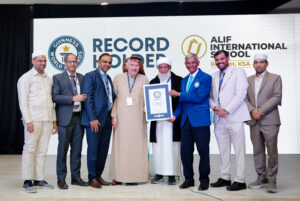
Riyadh – King Saud University Medical City has officially launched its first “Digital Health Innovation Hackathon – Healthon” bringing together industry leaders, government officials, and private sector innovators to propel advancements in digital healthcare.
The Acting President of King Saud University, Dr. Abdullah bin Salman Al-Salman, reaffirmed the university’s commitment to global leadership and excellence within the framework of Saudi Vision 2030. He emphasized that the event serves as a dynamic platform for creative minds to develop technological solutions aimed at enhancing quality of life and digital healthcare services.
Dr. Al-Salman expressed gratitude for the continuous support from the nation’s leadership and underscored the importance of the hackathon’s role in shaping the future of healthcare. The event, hosted at the university’s headquarters, is set to run until May 17, featuring approximately 400 contestants from diverse disciplines, including healthcare professionals, technologists, entrepreneurs, and researchers.
The hackathon encompasses six main tracks, covering smart healthcare solutions, chronic disease monitoring via IoT, predictive healthcare powered by AI, user experience optimization, cybersecurity in healthcare, and big health data analysis. Participants will engage in rigorous problem-solving sessions to develop groundbreaking solutions.
Engineer Mubarak Al-Shahrani, Executive Director of Technology and Digital Transformation and General Supervisor of the event, highlighted that the initiative aims to foster a culture of innovation in healthcare. A specialized jury will assess the projects, with winners across all tracks receiving cash prizes totaling up to 600,000 Saudi riyals, along with incubation opportunities through the university’s business incubators.
King Saud University anticipates that the outcomes of “Healthon” will contribute to strengthening Saudi Arabia’s healthcare ecosystem, driving forward digital transformation, and supporting national talent in addressing contemporary healthcare challenges.




